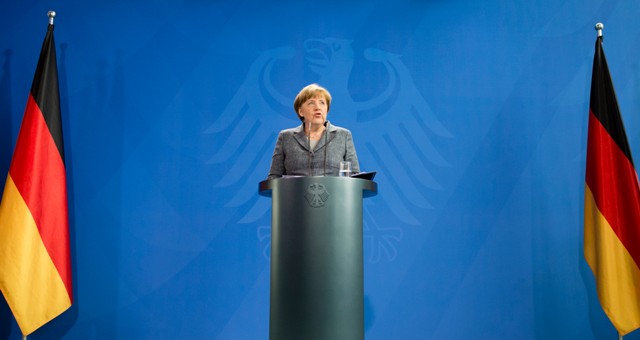The German government today gave the green light for prosecutors to open a criminal investigation into popular satirist Jan Böhmermann over a vulgar poem ridiculing Turkish President Recep Tayyip Erdoğan.
German Chancellor Angela Merkel, in granting a request by the Turkish government, underscored that Germany viewed the deteriorating situation of press freedom in Turkey with “great concern” but also highlighted her country’s “close partnership” with Turkey, including economic ties and a shared NATO membership.
Merkel indicated that her decision did not constitute a judgment of guilt or innocence on the part of Böhmermann, noting that it was “a matter for prosecutors and courts to decide the balance between personality rights and press freedom”. She added that the government had also committed to repeal Art. 103 of the German Criminal Code, under which Böhmermann will be investigated, which punishes insult of foreign heads of state with up to five years in prison.
The International Press Institute (IPI)’s German and Turkey National Committees today issued statements, carried below, on the Böhmermann controversy and its significance for developments in both countries.
———————————-
IPI German National Committee on the Böhmermann case
We don’t do justice to the sketch by Jan Böhmermann, aired on the ZDFneo programme Neo Magazin Royale, if we reduce it to the terrible words directed in poetic form at Turkish President Recep Tayyip Erdoğan.
The context in which the sketch was broadcast is the unparalleled criminal prosecution of journalists in Turkey. Since President Erdoğan took office in 2014, more than 1,800 criminal cases for insulting the president have been opened at his request, according to Turkey’s Justice Ministry. Vaguely defined legal provisions – in particular in the case of anti-terror laws – grant judges significant room for interpretation, which is largely filled in to the detriment of journalists. As a result, numerous journalists are currently behind bars in Turkey.
The fact that the Turkish President summoned the German Ambassador over a video about him aired on the satire programme “extra 3” indicates that the commonplace practice in Turkey of intimidating and prosecuting journalists is now poised to extend outside the country’s borders.
In this context, Böhmermann’s sketch illustrates the problems that follow when the crime of insult is exploited to intimidate journalists. The fact that the poem was preceded by a qualification indicating it would be illegal shows that the lines were presented in a facetious manner. The presenter uses them as examples without adopting them as conscious, willful insult. For this reason, his actions do not meet the legal defintion of insult. In disassociating himself thusly from the sketch’s completely exaggerated and baseless content, he intended to attract attention and prompt a public debate, which is precisely what occurred.
Böhmermann’s sketch is a work of satire that is protected by the fundamental rights of freedom of expression and artistic freedom.
If the Turkish President, both in his official capacity and as a private person now, demands – in contrast to other presidents in similar cases – that a criminal case against Jan Böhmermann be opened, it shows that he will forge ahead with his plan to intimidate journalists in Germany, too. Here, it becomes clear how important Jan Böhmermann’s push to have an open public discussion about this issue is.
———————————-
IPI Turkey National Committee on the Böhmermann case
It is difficult to qualify Jan Böhmermann’s piece as “satire” given its vulgar, obscene and coarse content. Had it been done wittily and subtly, it would deserve to be seen as “satire” – but it’s not. On the contrary, the video content technically matches what we would call “insult”. One could even argue that it contains subliminal racism. It is hard to understand how and on what ground ZDF could have shown this poor content and any argument that can be advanced on the ground of making a “legitimate provocation” falls short of being convincing.
Nevertheless, the request by Ankara for Böhmermann’s prosecution under German law is also an excess. It reflects the authoritarian political culture of Turkey’s ruler to stifle criticism, irrespective of whether that criticism is legitimate or not. Ankara’s sensible reaction to Böhmermann’s video should have been to ignore it completely. By reacting this way, Ankara lays the ground for it to be the subject of further ridicule by its critics in Germany.
